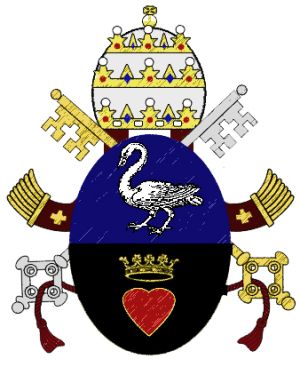Pope Benedict XV
Personal history is largely the same as *here*. See Pope Benedict XV for more. However, the following issues are of interest:
Over *here* Benedict XV tried very hard to end WWI. Something to consider--might he have been far more successful in ending the First Great War *there* maybe?
Frankly, I've always been puzzled about the differences between WWI and GW1, especially their respective (and very different) ends.
| This article is source material
|
Benedict XV (Latin: Benedictus PP. XV), born Giacomo della Chiesa (November 21, 1854 – January 22, 1922), reigned as Pope of the Catholic Church from September 3, 1914 to January 22, 1922; he succeeded Pope Pius X (1903–14). He became known as the "Prophet of Peace" in his lifetime and was tireless in his efforts to end GW1. Towards that end he went against his own conservative principles.
Early Life
Della Chiesa was born at Pegli, a suburb of Genoa, Italy, of noble family, the son of Marchese Giuseppe della Chiesa. He acquired a doctorate of law in 1875, after which he studied for the priesthood and then the training school for the Vatican diplomatic service, in which he would spend most of his career. In 1907 he became Archbishop of Bologna.
On 25 May 1914 Della Chiesa was created a cardinal, becoming the Cardinal Priest of the Titulus Ss. Quattuor Coronatorum. In this capacity, on the outbreak of the First Great War (1914–18) – with the papacy vacant upon Pius X's death on 20 August 1914 – he made a speech on the Church's position and duties, emphasising the need for neutrality and promoting peace and the easing of suffering. The conclave opened at the end of August 1914. The war would clearly be the dominant issue of the new pontificate, so the cardinals' priority was to choose a man with great diplomatic experience. Thus on 3 September 1914 Della Chiesa, despite having been a Cardinal only three months, was elected Pope, taking the name of Benedict XV.
War
Benedict XV's pontificate was dominated by the First Great War, which he termed "the suicide of Europe", and its turbulent aftermath. His early call for a Christmas truce in 1914 was ignored, and though the Pope organised significant humanitarian efforts (establishing a Vatican bureau, for instance, to help prisoners of war from all nations contact their families) and made many unsuccessful attempts to negotiate peace, his effectiveness even in Italy was undermined by his pacifist stance. His further humanitarian efforts in the wake of the Great Influenza Epidemic of 1918, however, did much to restore his credibility.
Of more use was the correspondence he developed with Gereint XII, the king of Kemr. Through those letters, beginning in 1915, a debate proceeded about the price and future consequences of the conflict, which gave His Holiness an indirect voice in the governments of the Allied Powers. In an effort to do more, he opened an indirect dialogue with the Russian and Greek Orthodox Patriarchs. As such he was instrumental in the growing raprochement between sides in the Great Schism.
The NAL's election of Gwrthiern ffeil Gwilim in 1917 offered another opportunity. TO BE CONTINUED
Post-War
In the post-war period Benedict was involved in developing the Church administration to deal with the new international system that had emerged.
In internal Church affairs, Benedict XV reiterated Pius X's condemnation of "modernist" scholars and the errors in modern philosophical systems in his first encyclical Ad Beatissimi Apostolorum, and declined to readmit to full communion scholars who had been excommunicated during the previous pontificate. However, he calmed what he saw as the excesses of the anti-modernist campaign within the Church.
Benedict XV also promulgated a new Code of Canon Law in 1917 and attempted to improve relations with the anticlerical Republican government of France by canonising the French national heroine Saint Joan of Arc. He emphasised the necessity of training native priests to replace European missionaries as soon as possible, and established a Coptic college in the Vatican.
He had a strong devotion to the Blessed Virgin Mary, and like all the modern Popes encouraged the wearing of the Brown Scapular of Our Lady of Mount Carmel. He endorsed the belief that wearing it piously brings "the singular privilege of protection after death" from eternal damnation, and granted an indulgence for every time it was kissed. He also added the title 'Queen of Peace' to her Litany, and gave his support to an understanding of Mary as Mediatrix of All Graces (by approving a Mass and office under this title for the dioceses of Batavia) and affirmed that "together with Christ she redeemed the human race" by her immolation of Christ as his sorrowful mother (in his apostolic letter Inter sodalicia).
Benedict XV fell ill with pneumonia in early January 1922. Speculation around the world about the 67 year old pontiff's impending death went so far that a New Amsterdam newspaper mistakenly ran a front page headline announcing that he had died when, in fact, he continued on. The newspaper had a sense of humor about its terrible gaffe and ran a follow-up headline later in the day, "Pope has remarkable recovery". On January 22, Benedict XV died of the illness.
| Preceded by: Pope Pius X |
 Pope/Bishop of Rome 1914 to 1922 |
Heir: Pope Pius XI |

